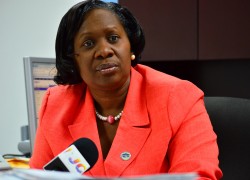
In the wake of dismal Bahamas General Certificate for Secondary Education (BGCSE) results, Bahamas Union of Teachers (BUT) President Belinda Wilson is calling for a change in the national curriculum to achieve more desirable results in the national examinations.
Last week, Ministry of Education officials announced that this year’s BGCSE results revealed that the average grade for English was a ‘D’ and the average grade for Mathematics was an ‘E’.
Minister of Education, Science and Technology Jerome Fitzgerald called the results “disappointing and unacceptable”.
While noting that the examinations are not the way to measure a child’s success, Mrs. Wilson told the Bahama Journal that the government needs to examine the national curriculum.
“The union has been asking for and been pushing for so long a revision of the curriculum. We are saying if you are seeing the results annually then you know where the strengths and the weaknesses are. So in order for you to improve the results there has to be a plan first of all. The results will not come automatically, overnight or within one year. You are going to have incremental results. That will only come with when you take these stats, you analyse that and you use that to review the curriculum,” she said.
“You need to also have the strategies and skills we are going to need to give quality instruction to our students. So I am hoping that we don’t lament the results again as we do every year – like the last 10 years and do nothing.”
Mrs. Wilson said the government should engage all the stakeholders to improve the education system.
She said when it comes to the criticisms teachers get for the results the buck does not stop with them.
“In every group you find that you have someone who is considered weak. If you have someone who is weak who is a teacher, then that person first of all needs to be mentored, professional development training so that person gets support. So if there are weak teachers, then there is a weak minister, a weak permanent secretary, weak director, a weak district superintendent, principal, vice principal, senior master and head of department because this teacher is supervised by all of them,” she said.
“So someone should be able to find that weakness and determine what that teacher needs. But it cannot be that the teacher is weak is the end all and be all because it takes more than a strong teacher to get the results from students that we want to achieve.”
Mrs. Wilson said she believes one of the problems is that the Ministry of Education is not using the BUT to its full advantage.
“We are always seen as adversarial but they are not aware of the help that we really can give because we are on the ground. We have shop stewards in every school in The Bahamas. The teachers would come and speak with the union before they come and speak with the employer. If there is a weakness the teacher would even share that with us. So unless they realise how important a partner the union is, I don’t know if they would be that open to accepting a plan from the union,” the BUT leader said.
Mrs. Wilson said if she had it her way the national curriculum would be revised from the primary school level.
“You start from your reading and writing and phonics making sure that you can spell. Then you build on that. I think we need remedial speciality teachers at all levels. School is opening a few weeks. We need to make sure that we have enough manpower to ensure that those programmes can actually follow through. So there is a lot to do. Education has to be a partnership,” she said.


